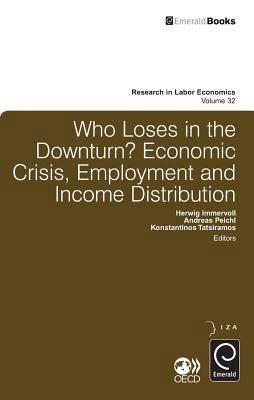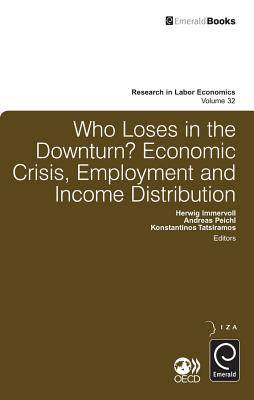
Bedankt voor het vertrouwen het afgelopen jaar! Om jou te bedanken bieden we GRATIS verzending (in België) aan op alles gedurende de hele maand januari.
- Afhalen na 1 uur in een winkel met voorraad
- In januari gratis thuislevering in België
- Ruim aanbod met 7 miljoen producten
Bedankt voor het vertrouwen het afgelopen jaar! Om jou te bedanken bieden we GRATIS verzending (in België) aan op alles gedurende de hele maand januari.
- Afhalen na 1 uur in een winkel met voorraad
- In januari gratis thuislevering in België
- Ruim aanbod met 7 miljoen producten
Zoeken
Who Loses in the Downturn?
Economic Crisis, Employment and Income Distribution
€ 302,95
+ 605 punten
Omschrijving
Economic events such as the recent global economic crisis can have substantial effects on the distribution of resources at the individual and household levels. Identification of appropriate and timely policy responses that support vulnerable groups is hampered by how little is known about the likely patterns of losses early on during the downturn. This volume contains fresh knowledge on the effects of the economic downturn on employment and income distribution. It contains 9 original research papers from both Europe and the US, including illustrations of forward-looking simulation methods that can be used before detailed data on actual household experiences become available. These papers offer new insights into issues such as how wages, employment and incomes are affected by the crisis, which demographic groups are most vulnerable in the recession, how well the welfare system protects the newly unemployed and how consumption and income poverty change over the business cycle.
Specificaties
Betrokkenen
- Uitgeverij:
Inhoud
- Aantal bladzijden:
- 300
- Taal:
- Engels
- Reeks:
- Reeksnummer:
- nr. 32
Eigenschappen
- Productcode (EAN):
- 9780857247490
- Verschijningsdatum:
- 15/04/2011
- Uitvoering:
- Hardcover
- Formaat:
- Genaaid
- Afmetingen:
- 155 mm x 231 mm
- Gewicht:
- 566 g

Alleen bij Standaard Boekhandel
+ 605 punten op je klantenkaart van Standaard Boekhandel
Beoordelingen
We publiceren alleen reviews die voldoen aan de voorwaarden voor reviews. Bekijk onze voorwaarden voor reviews.








